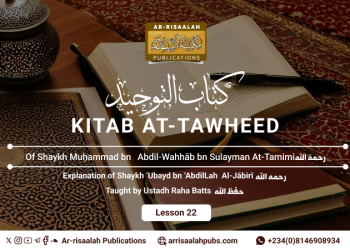All praise is due to Allāh, the Lord of the worlds. And may He extol the Messenger in the highest company of Angels, and grant him peace, likewise to his family, Companions and those who follow him until the Day of Resurrection.
Kitāb At-Tawḥīd
Book of Imām Muḥammad bn ʿAbdil-Wahhāb bn Sulaymān At-Tamīmī رحمه الله
Explanation of Shaykh ʿUbayd bn ʿAbdillāh al-Jabirī رحمه الله
Taught by Ustādh Raha Batts حفظه الله
Points discussed during the class:
- The statement of Allāh “Those who do not associate partners with their Lord.”
- The command of Allāh and His praise for those who do not associate partners with Him.
- Result of minor shirk and major shirk.
- From the characteristics of a Walī of Allāh.
- 5 Qualities of specific servants of Allāh from the verses in Sūrah Al-Mu’minun: 57-60.
- Fearing Allāh and Hoping in His Mercy.
- Having Iman in the Ayāt of Allāh.
- Do not associate partners with Allāh.
- Perform obligations fearing it would not be accepted by Allāh.
- They are forefront in doing good.
- The two types of Ayāt.
- The Ayāt of Allāh from His creations.
- The revelations – Kitāb and Sunnah.
- The angles which the people of sins and transgressions – Shaykh Al-Islām Ibn Taymiyyah.
- The humbleness of the Salaf with regards to their deeds.
- The Hadith of our mother ‘Aaishah with regards to the verses.
Question asked:
- When does the child become independent of himself such that he seek to move to another region to learn the religion and move away from his parents. How should he tell them? What should he do if the family disagrees of him leaving home to seek knowledge and how can he refute their claim that he would not come back home?
Listen to other lessons in the series HERE








